Many reports claim that little is known about the earliest history of Nigeria. By 2000 B.C. most of Nigeria was thinly occupied by people who had a basic knowledge of raising domesticated food plants and of herding animals. At the beginning of the 11th century, seven independent Hausa city-states were founded in Northern Nigeria. They were, Biram, Daura, Gobir, Kano, Katsina, Rano, and Zaria.
In the late 15th Century, Portuguese navigators became the first Europeans to visit the country. The Portuguese soon began to purchase slaves and agricultural produce from coastal middlemen; the slaves had been captured further inland by the middlemen. Following the arrival of Portuguese, British, French, and Dutch traders show up. Among the Igbo and Ibibio a number of city-states were established by individuals who had become wealthy by engaging in the slave trade.
In 1817, Usuman dan Fodio's son, Muhammad Bello established a state centered at Sokoto, which controlled most of N Nigeria until the coming of the British in 1900–1906. Under both Usuman dan Fodio and Muhammad Bello, Muslim culture, and also trade, flourished in the Fulani empire. In Bornu, Muhammad al-Kanemi was succeeded by Umar (reigned 1835–80), under whom the empire disintegrated.
In 1807, Great Britain abandoned the slave trade; however, other countries continued it until about 1875. In 1817 a long series of civil wars began in the Oyo Empire, they lasted until 1893, when Britain intervened. In 1861 Britain annexed Lagos. Eight years later (1879), Sir George Goldie gained control of all the British firms trading on the Niger, and in the 1880s he took over two French companies active there and signed treaties with numerous African leaders. In the following years, the British established their rule in SW Nigeria, partly by signing treaties (as in the Lagos hinterland) and partly by using force (as at Benin in 1897). Jaja, a leading African trader based at Opobo in the Niger delta and strongly opposed to European competition, was captured in 1887 and deported.
Colonialism
In 1900 the Royal Niger Company's charter was annulled and British troops under Frederick Lugard began to conquer the north, taking Sokoto in 1903. By 1906, Britain controlled Nigeria, which was divided into the Colony, Lagos and Protectorate of Southern Nigeria and the Protectorate of Northern Nigeria. In 1914 the two regions were amalgamated and the Colony and Protectorate of Nigeria was formed.
The administration of Nigeria was based on a system devised by Lugard and called “indirect rule”; under this system, Britain ruled through existing political institutions rather than establishing an entirely new administrative network. In some areas, new African officials were set up; in most cases they were not accepted by the mass of the people and were able to rule only because British power stood behind them. All important decisions were made by the British governor, and the African rulers, partly by being associated with the colonialists, soon lost most of their traditional authority.
Nigeria gaining Independence
Nigeria gained full independence in October 1960, as a confederation of three districts; Northern, Western and Eastern, all under a constitution that provided for a parliamentary form of government. Under the constitution, each of the three districts retained a considerable measure of self-government. The federal government was given elite powers in matters like defense and security, foreign relations, commercial and fiscal policies.
New Constitution
In October 1963, Nigeria altered its ties with the United Kingdom by proclaiming itself a federal republic and disseminated a new constitution. A fourth district; the Midwest, was established that year. Three years down the line (1966), a small group of army officers, mostly South Eastern Igbos, overthrew the government and assassinated the federal Prime Minister and the Premiers of the Northern and Western regions. The federal military government that assumed power was unable to address ethnic tensions or produce a constitution acceptable to all sections of the country. Its efforts to abolish the federal structure greatly raised tensions and led to another coup in July. The coup-related massacre of thousands of Igbo in the north prompted hundreds of thousands of them to return to the southeast, where increasingly strong Igbo secessionist sentiment emerged.
Economic development
Following the civil war, reconciliation was rapid and effective, and the country turned to the task of economic development. Foreign exchange earnings and government revenues increased spectacularly with the oil price rises of 1973-74. On July 1975, Gen. Murtala Muhammed and a group of fellow officers staged a bloodless coup, accusing Gen. Yakubu Gowon's military government of delaying the promised return to civilian rule and becoming corrupt and ineffective. General Muhammed replaced thousands of civil servants and announced a timetable for the resumption of civilian rule by October 1979.
Olusegun Obasanjo, became head of state
After General Muhammed was murdered in 1976, his chief of staff, Olusegun Obasanjo, became head of state. Obasanjo adhered meticulously to the schedule for return to civilian rule, moving to modernise and streamline the armed forces and seeking to use oil revenues to diversify and develop the country's economy. Seven new states were created in 1976, bringing the total to 19. The process of creating additional states continued until, in 1996, there were 36.
A constituent assembly was elected in 1977 to draft a new constitution, which was published September 1978, when the ban on political activity, in effect since the advent of military rule, was lifted. Political parties were formed, and candidates were nominated for president and vice president, the two houses of the National Assembly, governorships, and state houses of assembly. In 1979, five political parties competed in a series of elections in which a northerner, Alhaji Shehu Shagari of the National Party of Nigeria (NPN), was elected President. All five parties won representation in the National Assembly.
Second Republic toppled
In December 1983, the military overthrew the Second Republic. Major. General Muhammadu Buhari emerged as the leader of the Supreme Military Council (SMC), the country's new ruling body. He charged the civilian government with economic mismanagement, widespread corruption, election fraud, and a general lack of concern for the problems of Nigerians. Major. General Buhari also pledged to restore wealth to Nigeria and to return the government to civilian decree. Despite relative popularity for its no-nonsense approach in tackling corruption, the Buhari government was peacefully overthrown by the SMC's third-ranking member, Army Chief of Staff Major. General Ibrahim Babangida, in August 1985.
Release of Political Prisoners
Babangida moved to restore freedom of the press and to release political detainees being held without charge. As part of a 15-month economic crisis, he announced stringent pay cuts for the military, police, and civil servants and endorsed similar cuts for the private sector. Imports of rice, corn, and wheat were prohibited. Babangida orchestrated a national debate on proposed economic reform and recovery measures, which reportedly convinced him of intense opposition to an economic revival package dependent on an International Monetary Fund (IMF) loan.
The Abortive Third Republic
In early 1989, a constituent assembly completed work on a constitution for the Third Republic, and political activity again was permitted. In April 1990, mid-level officers tried and botched to overthrow Babangida, and 69 accused coup plotters were later executed after secret trials before military tribunals. In December 1990 the first stage of partisan elections was held at the local government level, followed by gubernatorial and state legislative elections in December 1991; elections were declared peaceful but turnout was low. According to reports Babangida canceled primaries scheduled for August and September 1992 due to fraud. All announced contenders were disqualified from again standing for president once a new election format was selected. Subsequent to delayed promises for elections in 1990, the government finally held a presidential election on June 12, 1993.
Most observers deemed the 1993 election as Nigeria's fairest elections. Early returns indicated that Yoruba businessman M.K.O. Abiola had won by a convincing victory. But on June 23, Babangida, using several pending lawsuits as pretence, annulled the election, throwing Nigeria into chaos. Scores of people were killed in riots before Babangida agreed to hand power to an "interim government" on August 27. Babangida then attempted to renege on his decision. Without popular and military support, he was forced to hand over to Ernest Shonekan, a prominent nonpartisan businessman. He was to rule until new elections, scheduled for February 1994.
Defense Minister Sani Abacha in Power
With the country sliding into turmoil, Defense Minister Sani Abacha rapidly assumed power and forced Shonekan's "resignation" on November 17, 1993. Abacha dissolved all democratic political institutions and replaced elected governors with military officers. Abacha promised to return the government to civilian rule but refused to reveal a timeframe. Following the annulment of the June 12 election, the United States and other nations imposed various sanctions on Nigeria, including restrictions on travel by government officials and their families and suspension of arms sales and military assistance. More sanctions were imposed as a result of Nigeria's failure to gain full certification for its counter-narcotics efforts.
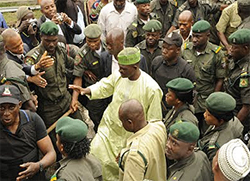 Defense Minister Sani Abacha surrounded by soldiers. Source: http://changeandrevolution.blogspot.com
Defense Minister Sani Abacha surrounded by soldiers. Source: http://changeandrevolution.blogspot.com
Although Abacha's takeover was initially welcomed by many Nigerians, disappointments grew rapidly. Many opposition figures formed the National Democratic Coalition (NADECO), to campaign for an immediate return to civilian regime, and most Nigerians boycotted the May 1994 polls for delegates to a government-sponsored Constitutional Conference. On June 1994, using the groundwork laid by NADECO, Abiola declared himself president and went into hiding. Abiola re-emerged and was arrested on June 23.
Timetable for a 3-year transition to civilian rule
In an October 1, 1995 address to the nation, Gen. Sani Abacha announced the timetable for a 3-year transition to civilian rule. Public turnout for his sham local elections in December 1997 and in April 1998 state assembly and gubernatorial elections was under 10%, and public reaction to Abacha's presidential nomination by the five accepted parties was apathy and a near-complete boycott. Widely expected to succeed himself as a civilian president on October 1, 1998, he remained head of state until his death on June 8 of that year. During the Abacha regime, the government continued to enforce its arbitrary authority through the federal security system--the military, the state security service, and the courts. Under Abacha, all branches of the security forces committed serious human rights abuses. Abacha was replaced by General Abdulsalami Abubakar, who subsequently released almost all known civilian political detainees and decreased the number of reported human rights abuses.
Abubakar's Transition to Civilian Regime
During both the Abacha and Abubakar eras, Nigeria's main decision-making organ was the exclusively military Provisional Ruling Council (PRC) which governed by decree. The PRC oversaw the 32-member Federal Executive Council composed of civilians and military officers. Pending the promulgation of the constitution written by the constitutional conference in 1995, the government observed some provisions of the 1979 and 1989 constitutions. Neither Abacha nor Abubakar lifted the decree suspending the 1979 constitution, and the 1989 constitution was not implemented. The judiciary's authority and independence was significantly impaired during the Abacha era by the military regime's arrogation of judicial power and prohibition of court review of its action. The court system continued to be hampered by corruption and lack of resources after Abacha's death. In an attempt to alleviate such problems, Abubakar's government implemented a civil service pay raise and other reforms.
In August 1998, the Abubakar government appointed the Independent National Electoral Commission (INEC) to conduct elections for local government councils, state legislatures and governors, the National Assembly, and president. INEC held a series of four successive elections between December 1998 and February 1999. Former military head of state Olusegun Obasanjo, freed from prison by Abubakar, ran as a civilian candidate and won the presidential election. Irregularities marred the vote, and the defeated candidate, Chief Olu Falae, challenged the electoral results and Obasanjo's victory in court.
The Obasanjo Administration
The emergence of a democratic Nigeria in May 1999 ended 16 years of consecutive military rule. Olusegun Obasanjo became the steward of a country suffering economic stagnation and the deterioration of most of its democratic institutions. Obasanjo, a former general, was admired for his stand against the Abacha dictatorship, his record of returning the federal government to civilian rule in 1979, and his claim to represent all Nigerians regardless of religion.
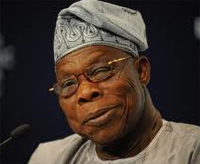 Olusegun Obasanjo. Source: http://www.punchng.com
Olusegun Obasanjo. Source: http://www.punchng.com
The new President took over a country that faced many problems, including a dysfunctional bureaucracy, collapsed infrastructure, and a military that wanted a reward for returning quietly to the barracks. The President moved quickly and retired hundreds of military officers who held political positions, established a blue-ribbon panel to investigate human rights violations, ordered the release of scores of persons held without charge, and rescinded a number of questionable licenses and contracts let by the previous military regimes. The government also moved to recover millions of dollars in funds secreted in overseas accounts.
Most civil society leaders and most Nigerians saw a marked improvement in human rights and democratic practice under Obasanjo. The press enjoyed greater freedom than under previous governments. As Nigeria works out representational democracy, there have been conflicts between the executive and legislative branches over major appropriations and other proposed legislation. A sign of federalism has been the growing visibility of state governors and the inherent friction between Abuja and the various state capitols over resource allocation.
In the years following the end of military rule, Nigeria witnessed recurrent incidents of ethno-religious and community conflicts, many of which derived from distorted use of oil revenue wealth, flaws in the 1999 constitution, and longstanding disputes over the distribution of land and other resources. In May 1999, violence erupted in Kaduna State over the succession of an Emir, resulting in more than 100 deaths. In November 1999, the army destroyed the town of Odi in Bayelsa State and killed scores of civilians in retaliation for the murder of 12 policemen by a local gang.
In Kaduna in February-May 2000 over 1,000 people died in rioting over the introduction of criminal Shar'ia in the state. Hundreds of ethnic Hausa were killed in reprisal attacks in southeastern Nigeria. In September 2001, over 2,000 people were killed in inter-religious rioting in Jos. In October 2001, hundreds were killed and thousands displaced in communal violence that spread across the Middle-Belt states of Benue, Taraba, and Nasarawa. On October 1, 2001, President Obasanjo announced the formation of a National Security Commission to address the issue of communal violence. In 2003, he was re-elected in contentious and highly flawed national elections and state gubernatorial elections, which were litigated over 2 years. Since 2006, violence, destruction of oil infrastructure, and kidnappings of primarily expatriates in the oil-rich Niger River Delta have intensified as militants demanded a greater share of federal revenue for states in the region, as well as benefits from community development. For many reasons, Nigeria's security services have been unable to respond effectively to the security threat, which is both political and criminal.
In May 2006, the National Assembly soundly defeated an attempt to amend the constitution by supporters of a third presidential term for President Obasanjo. This measure was packaged in a bundle of what were otherwise non-controversial amendments. Nigeria's citizens addressed this issue in a constitutional, democratic, and relatively peaceful process.
Civilian Transition
Nigeria held state legislative and gubernatorial elections on April 14 as well as presidential and national legislative elections on April 21, 2007, in which more than 35 political parties participated. International observers reported overall a gravely defective process with credible reports of malfeasance and vote rigging in some constituencies. The scope of violence that occurred also was regrettable. There were considerable degrees of difference in the conduct of elections among states, but serious differences were also observed within states during the two polling dates. The main opposition parties, All Nigeria People's Party (ANPP) and the Action Congress (AC), as well as numerous smaller political parties and the ruling People's Democratic Party (PDP) filed petitions to challenge the results of gubernatorial elections in 34 of Nigeria's 36 states.
The Court of Appeal received 1,527 petitions, a tripling of the 527 petitions filed and received in 2003. Nigeria's National Electoral Commission (INEC) experienced significant problems, including politicization and lack of independence; lack of transparency in its operations and decision-making; and persistent failure to make adequate logistical arrangements for both voter registration and polling. However, Nigeria experienced its first transition of power between civilian administrations when President Obasanjo stepped down on May 29, 2007. Newly-elected President Umaru Yar'Adua, a moderate and a respected governor from the northern state of Katsina, pledged publicly to make electoral reform, peace and security in the Niger Delta, and continued electoral reform his top priorities.
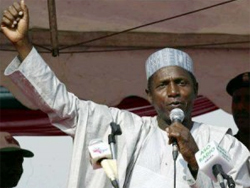 Newly-elected President Umaru Yar'Adua. Source:http://www.internaija.com
Newly-elected President Umaru Yar'Adua. Source:http://www.internaija.com
Much restructuring remained to be implemented, but the Yar'Adua administration showed restraint in allowing the legislative and judicial branches to operate relatively freely. In October 2007 Patricia Etteh, the Speaker of the Federal House of Representatives, resigned over allegations of corruption, after intense legislative and public pressure. Of significance for Nigeria's system of checks and balances and the rule of law, on November 12, 2008 an appeals court upheld a lower court ruling that approved an opposition party's gubernatorial election appeal, effectively unseating the ruling party's incumbent in favour of the opposition candidate. By a 4-3 vote, Nigeria’s Supreme Court on December 12, 2008 upheld the results of the presidential election and dismissed the appeals of the two other primary contenders.
President Yar’Adua dies
On November 23, 2009, President Yar’Adua was flown to Jeddah, Saudi Arabia for urgent medical treatment. After a prolonged absence, in February 2010 the Nigerian National Assembly approved a resolution that transmitted presidential power to Vice President Goodluck Jonathan, giving him the title and responsibilities of Acting President. On 17 March 2010, Acting President Goodluck Jonathan dissolved the country's cabinet, and swore in new cabinet ministers on 06 April 2010. Following the death of President Yar’Adua on 6 May 2010, the Nigerian Chief Justice swore in Goodluck Jonathan as President.
Nigeria Elections April 2011
Yet again, the much-hyped, much anticipated merger talks between the Nigeria’s two leading political parties; the South West dominated Action Congress of Nigeria [ACN] and the Northerly effective Congress for Progressive Change (CPC) had broken down, only three days before to the presidential elections.
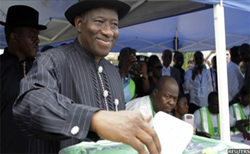 Goodluck Jonathan casting his vote. Source:http://www.bbc.co.uk
Goodluck Jonathan casting his vote. Source:http://www.bbc.co.uk
The large population of the country forced the Independent National Electoral Commission (INEC) to erect over 120,000 polling stations across the country; from the winding, damp creeks of Nigeria's oil rich Niger Delta in the South, to the desert plains of Nigeria's North, no area was left uncovered.
Violence erupted during polls
In Abuja, at least five people had been reported killed in violence that erupted in different parts of North East Nigeria’s Bauchi state after the presidential election. Cars, houses and other valuables were destroyed when irate youths who are mostly under-aged believed to be supporting an opposition party unleashed terror on innocent people in the name of protecting votes cast in favour of the party they support, the sources added.
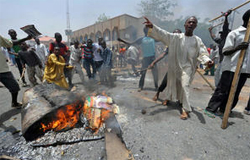 Violence erupted in different parts of North East Nigeria’s Bauchi state after the presidential election. Source:http://www.hrw.org
Violence erupted in different parts of North East Nigeria’s Bauchi state after the presidential election. Source:http://www.hrw.org
According to reports the very angry youths were protesting what they described as insufficient ballot papers made available to the polling units during the conduct of the election. The INEC, however, denied the accusation and described the youths’ action as impatience as enough ballot papers were made available for the area
Credible reports demonstrated that Peoples Democratic Party (PDP) led by its presidential candidate, Goodluck Jonathan has won 16 April 2011 presidential polls. In a historic victory, several sources reported that PDP swept the entire former Eastern region and swept South-Western Nigeria.